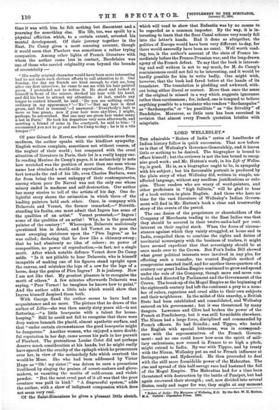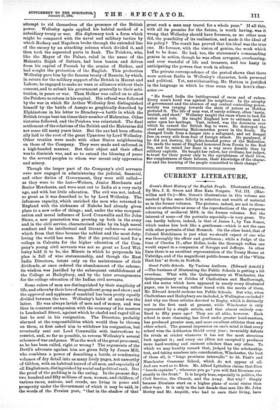LORD WELLESLEY.*
THE admirable " Rulers of India " series of handbooks of Indian history follow in quick succession. That now before us is that of Wellesley's Governor-Generalship, and it leaves little or nothing to be desired. The biographer is bound to efface himself ; but the reviewer is not the less bound to recog- nise good work; and Mr. Hutton's work, in his Life of Welles- ley, is good. He is, as a biographer ought to be, in sympathy with his subject ; but his favourable portrait is produced by the plain story of what Wellesley did, written in simple, un- affected language, without any needless justifications or eulo- gies. Those readers who are weary of word-painters, and other proficients in " high fallutin," will be glad to hear of a book written in plain English. And those who have no time for the vast literature of Wellesley's Indian Govern- ment will find in Mr. Hutton's book a clear and trustworthy story of the events of the period.
The one desire of the proprietors or shareholders of the Company of Merchants trading to the East Indies was that they should be secured in their twelve•and-a-half per cent. interest on their capital stock. When the force of circum- stances against which they vainly struggled, at home and in India, compelled them to combine the rights and duties of territorial sovereignty with the business of traders, it might have seemed expedient that that sovereignty should be at once made over to the Crown. But Fox's India Bill showed what great political interests were involved in any plea for effecting such a transfer, the wonted English method of compromise asserted itself, and for another three-quarters of a century our great Indian Empire continued to grow and spread under the rule of the Company, though more and more con- trolled and directed by Parliament and the Government of the Crown. The break-up of the Mogul Empire at the beginning of the eighteenth century had left the continent a prey to a num- ber of rulers, rapacious and cruel alike to their own subjects and their neighbours. In the midst of this anarchy, a British State had been established and consolidated, and Wellesley entered on his government ; but it was threatened by many dangers. Lawrence and Clive had broken the power of the French at Pondicherry, but it was still formidable elsewhere. The Nizam had a large force, disciplined and commanded by French officers. So had Scindia ; and Tippoo, who hated the English with special bitterness, was in correspond- ence with the representatives of the French Govern- ment : and no one could know how soon the spirit of mili- tary enthusiasm, now roused in France to so high a pitch, might extend to India. By war with Tippoo, and by treaty with the Nizam, Wellesley put an end to French influence at Seringapatam and Hyderabad. He then proceeded to deal with the still more formidable power of the Mahrattas. The rise and spread of this half-savage race had hastened the fall of the Mogul Empire. The Mahrattas had for a time been threatened with destruction by the battle of Paniput, but had again recovered their strength ; and, now divided into several States, ready and eager for war, they might at any moment • Rulers of India: The Marquess of Wellesley, IC.G. By the Rev. W. H. Hutton, M.A. Oxford : °Inroad= Press. 1893.
attempt to rid themselves of the presence of the British power. Wellesley again applied his habital method of a subsidiary treaty or war. His diplomacy took a form which might be compared with the naval and military tactics by which Rodney and Napoleon broke through the extended line of the enemy by an attacking column which divided it, and then took the separated parts in flank. The Peishwa, who, like the Mayor of the Palace, ruled in the name of the Mahratta Rajah of Sattara, had been beaten and driven from his capital of Poonah by the armies of Holkar, and had sought the protection of the English. This protection Wellesley gave him by the famous treaty of Bassein, by which, in return for the military support of the British in Meerut and Lahore, he engaged to make no wars or alliances without their consent, and to submit his government generally to their arbi- tration, in peace or war. Then Holkar was called on to allow the Peishwa to return to his capital. His refusal was followed by the war in which Sir Arthur Wellesley first distinguished himself by the battle of Assaye so graphically described by Elphinstone in his letter to Strachey—a battle in which the British troops beat ten times their number of Mahrattas. Other victories followed, and the Peishwa was reinstated. The final settlement of the relations of the British and the Mahrattas did not come till many years later. But the axe had been effectu- ally laid to the root of the great Upas-tree by Lord Wellesley. Other treaties were made with other States neighbouring on those of the Company. They were made and enforced in a high-handed manner. But their object and their effect was to diminish war, and so to extend the blessing of peace to the several peoples to whom war meant only oppression and misery.
Though the larger part of the Company's civil servants were now engaged in administering the judicial, financial, and other duties of Government, they were still called— as they were to the last—Writers, Junior Merchants and Senior Merchants, and were sent out to India at a very early age, and with but little education. The evil was not, indeed, so great as it was described to be by Lord Wellesley. The infamous rapacity, which enriched the men who returned to England with the nickname of Nabobs had already given place to a new order of things ; and, under the wise reorgani- sation and moral influence of Lord Cornwallis and Sir John Shore, a new generation was growing up both in the army and in the civil service, characterised alike by its high moral conduct and its intellectual and literary culture—a service which from that time became the noblest and the most duty- loving the world has seen. But if the practical need for a college in Calcutta for the higher education of the Com- pany's young civil servants was not so great as Lord Wel- lesley held it to be, the Minute in which be propounds his plan is full of wise statesmanship, and though the East India Directors, intent only on the maintenance of their dividends, at once ordered the abandonment of the scheme, its wisdom was justified by the subsequent establishment of the College at Haileybury, and by the later arrangements for the college education of the Indian civil servants.
Some rulers of men are distinguished by their simplicity of life, and others by their love of magnificent pomp and show; and the approval and applause of mankind has been pretty equally divided between the two. Wellesley's habit of mind was the latter. He was always lavish of men and of money, and was thus in constant antagonism with the economy of his masters in Leadenhall Street, against which he chafed and raged till at last he sent in his resignation. The Directors, probably alarmed at the responsibilities which would thus be thrown on them, at first asked him to withdraw his resignation, but
eventually sent out Lord Cornwallis with instructions to restrict, and, so far as possible, to reverse Wellesley's several schemes of war and peace. Was the work of the great proconsul, as he has been called, right or wrong P The arguments of the Devil's advocate against him are given fully by James Mill, who combines a power of describing a battle, or condensing
volumes of dry detail into as many lively pages, not unworthy of Gibbon, with an habitual hatred of all men, and especially of
all Englishmen, distinguished by social and political rank. But the proof of the pudding is in the eating. In the present day, two hundred and fifty millions of men, women, and children, of
various races, nations, and creeds, are living in peace and prosperity under the Government of which it may be said, in the words of the Persian poet, "that in the shadow of that
great rook a man may travel for a whole year." If all this, with all its promise for the future, is worth having, was it wrong that Wellesley should have foreseen, as no other man did, the possibility of its realisation, and made it the ideal of his policy P The result has proved that his ideal was the true one. He foresaw, with the vision of genius, the work which had to be done. He had, too, the statesman's commanding genius in action, though he was often arrogant, overbearing, and ever wasteful of life and treasure, and too hasty in anticipating the powers that work in silence.
The private correspondence of the period shows that there were serious faults in Wellesley's character, both personal and political. Yet, notwithstanding, Mr. Hutton is justified in the language in which he thus sums up his hero's char- acter :- " He found India the battleground of races and of rulers. Every man's hand was against his neighbour. In the atrophy of government and the absence of any central controlling power. society was verging towards the state of nature as Hobbes pictured it. The life of man was, if rarely solitary, often • nasty, brutish, and short.' Wellesley taught the races where to look for union and rule. He taught England how to estimate and to enter upon her heritage. Vast, indeed, was the dominion over which he caused the British flag to wave. He destroyed the cruel and threatening Mahommedan power in the South. He changed Ondh from a danger into a safeguard, and set Bengal free on every side from fear of foreign attack. He paralysed, if he did not destroy, the hydra-headed power of the Mahrattas. He made the name of England honoured from Persia to the Red Sea, and he raised her fame in a way more durable than by military exploits. He taught her rulers, her civilians, her judges, to trust for their power only to the uprightness of their lives, the completeness of their labours, their knowledge of the charac- ter and the learning of the people committed to their charge."



















































 Previous page
Previous page